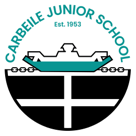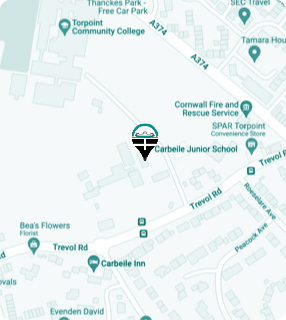Intent:
At Carbeile, we have chosen to use the Kapow Primary Computing scheme. This aims to instil a sense of enjoyment around using technology and to develop pupil’s appreciation of its capabilities and the opportunities technology offers to create, manage, organise, and collaborate. Tinkering with software and programs forms a part of the ethos of the scheme as we want to develop pupils’ confidence when encountering new technology, which is a vital skill in the ever evolving and changing landscape of technology. Through our curriculum, we intend for pupils not only to be digitally competent and have a range of transferable skills at a suitable level for the future workplace, but also to be responsible online citizens. The scheme of work enables pupils to meet the end of Key Stage Two attainment targets outlined in the National curriculum and the aims align with those in the National curriculum. Our Computing scheme of work satisfies all the objectives of the DfE’s Education for a Connected World framework. This guidance was created to help equip children for life in the digital world, including developing their understanding of appropriate online behaviour, copyright issues, being discerning consumers of online information and healthy use of technology.
Implementation of the Computing Curriculum:
The National curriculum purpose of study states: ‘The core of computing is computer science, in which pupils are taught the principles of information and computation, how digital systems work, and how to put this knowledge to use through programming. Building on this knowledge and understanding, pupils are equipped to use information technology to create programs, systems, and a range of content. Computing also ensures that pupils become digitally literate – able to use, and express themselves and develop their ideas through, information and communication technology – at a level suitable for the future workplace and as active participants in a digital world’. Therefore, the Kapow Primary scheme of work is designed with three strands which run throughout:
- Computer science • Information technology • Digital literacy
Our Progression of skills shows the skills that are taught within each year group and how these skills develop year on year to ensure attainment targets are securely met by the end of each key stage. 3 The Kapow Primary scheme is organised into five key areas, creating a cyclical route through which pupils can develop their computing knowledge and skills by revisiting and building on previous learning:
- Computer systems and networks • Programming • Creating media
- Data handling • Online safety
The implementation of Kapow Primary Computing ensures a broad and balanced coverage of the National curriculum requirements, and our ‘Skills showcase’ units provide pupils with the opportunity to learn and apply transferable skills.
Where meaningful, units have been created to link to other subjects such as science, art, and music to enable the development of further transferable skills and genuine cross-curricular learning. Lessons incorporate a range of teaching strategies from independent tasks, paired and group work as well as unplugged and digital activities. This variety means that lessons are engaging and appeal to those with a variety of learning styles. Differentiated guidance is available for every lesson to ensure that lessons can be accessed by all pupils and opportunities to stretch pupils’ learning are available when required.
Knowledge organisers for each unit support pupils in building a foundation of factual knowledge by encouraging recall of key facts and vocabulary. The computing curriculum has been created to ensure teaching staff deliver lessons that are of a high standard and ensure pupil progression.
Impact of the Computing Curriculum:
The impact of Kapow Primary’s scheme can be constantly monitored through both formative and summative assessment opportunities. Each lesson includes guidance to support teachers in assessing pupils against the learning objectives and each unit has a unit quiz and knowledge catcher which can be used at the start and/ or end of the unit. After the implementation of Kapow Primary Computing, pupils should leave school equipped with a range of skills to enable them to succeed in their secondary education and be active participants in the ever-increasing digital world. The expected impact of following the Kapow Primary Computing scheme of work is that children will:
- Be critical thinkers and able to understand how to make informed and appropriate digital choices in the future.
- Understand the importance that computing will have going forward in both their educational and working life and in their social and personal futures.
- Understand how to balance time spent on technology and time spent away from it in a healthy and appropriate manner.
- Understand that technology helps to showcase their ideas and creativity. They will know that different types of software and hardware can help them achieve a broad variety of artistic and practical aims.
- Show a clear progression of technical skills across all areas of the National curriculum – computer science, information technology and digital literacy.
- Be able to use technology both individually and as part of a collaborative team.
- Be aware of online safety issues and protocols and be able to deal with any problems in a responsible and appropriate manner.
- Have an awareness of developments in technology and have an idea of how current technologies work and relate to one another.
- Meet the end of key stage expectations outlined in the National curriculum for Computing.
Computing Co-ordinator: Mr Davey
Digital Literacy
Alongside discrete Computing days, children also use technology in everyday lessons for research, typing and creating documents linked to their learning.
E-Safety
Carbeile are very serious about e-safety and are currently collecting evidence to gain the 360 Mark. E-safety is mentioned in every Computing lesson, during assemblies and Safer Internet Day is always celebrated. There is also an e-safety section in every newsletter offering information and advice. Please see our e-safety page for more information.
Memory
Computing skills are relevant throughout our whole lives, which is why it is important to solidify these skills in our children’s long term memories. Repetition of skills and continually raising awareness of e-safety means Carbeile children are equipped for life in a technological world!
Speaking and Listening
Collaboration is regularly used in Computing, whether it is helping each other film a video, working on a group research project or writing code together. Children communicate with each other and listen to ideas in order to complete these tasks effectively.
Enrichment in Computing at Carbeile
Digital Leaders
Digital Leaders work from each class to spread the message of e-safety, as well as attend trips and workshops. Children choose to be Digital Leaders by writing a manifesto and are then voted in by their peers.
PTFA Fundraising
Alongside this, Carbeile has been/are raising money for new laptops. We now have 32 new Google Chrome laptops that allow the children to access and work through Google Classroom.
Useful Links for you
Computing was previously ICT in schools and the new curriculum could be seen as daunting. The links below will hopefully provide some guidance and support around the new curriculum, along with websites to support your child with e-safety. Also keep an eye on the newsletters as they have regular guidance and advice around e-safety.
https://www.saferinternet.org.uk/advice-centre/parents-and-carers
https://www.nspcc.org.uk/preventing-abuse/keeping-children-safe/online-safety/
https://www.childnet.com/parents-and-carers
https://www.ceop.police.uk/safety-centre/
https://www.theschoolrun.com/primary-school-coding-explained-for-parents
Home Learning
On the home learning sheets which are sent home at the beginning of every new topic, there is often a Computing/ICT task available for your child to tackle.
Policies
Please click through the links below to find all of the policies and documents we work from at Carbeile.
![]()

